Legal Compliance of Coca-Cola in International Business and Australia
VerifiedAdded on 2023/01/20
|10
|2866
|39
Report
AI Summary
This report examines the legal aspects of Coca-Cola's international business operations, focusing on its activities in Australia. It begins with an executive summary and table of contents, then delves into the company's global and Australian presence, including employee numbers. The report identifies key legislative policies Coca-Cola must adhere to, such as the Australian Business Number, health and safety regulations, and taxation laws, including corporate tax and GST. It also covers the Fair Trading Act 1992 and the Competition and Consumer Act 2010, highlighting provisions related to fair competition and consumer protection. The report further analyzes how international treaties, conventions, and agreements, such as Free Trade Agreements (FTAs) like the AUSFTA, and the Food Standards Australia and New Zealand Act 1991, impact Coca-Cola's operations by facilitating trade and reducing legal barriers. It concludes by discussing the challenges of operating in markets like China and the importance of complying with employment laws, such as the Fair Work Act 2009. This assignment provides a comprehensive overview of the legal landscape affecting Coca-Cola's global business strategy.
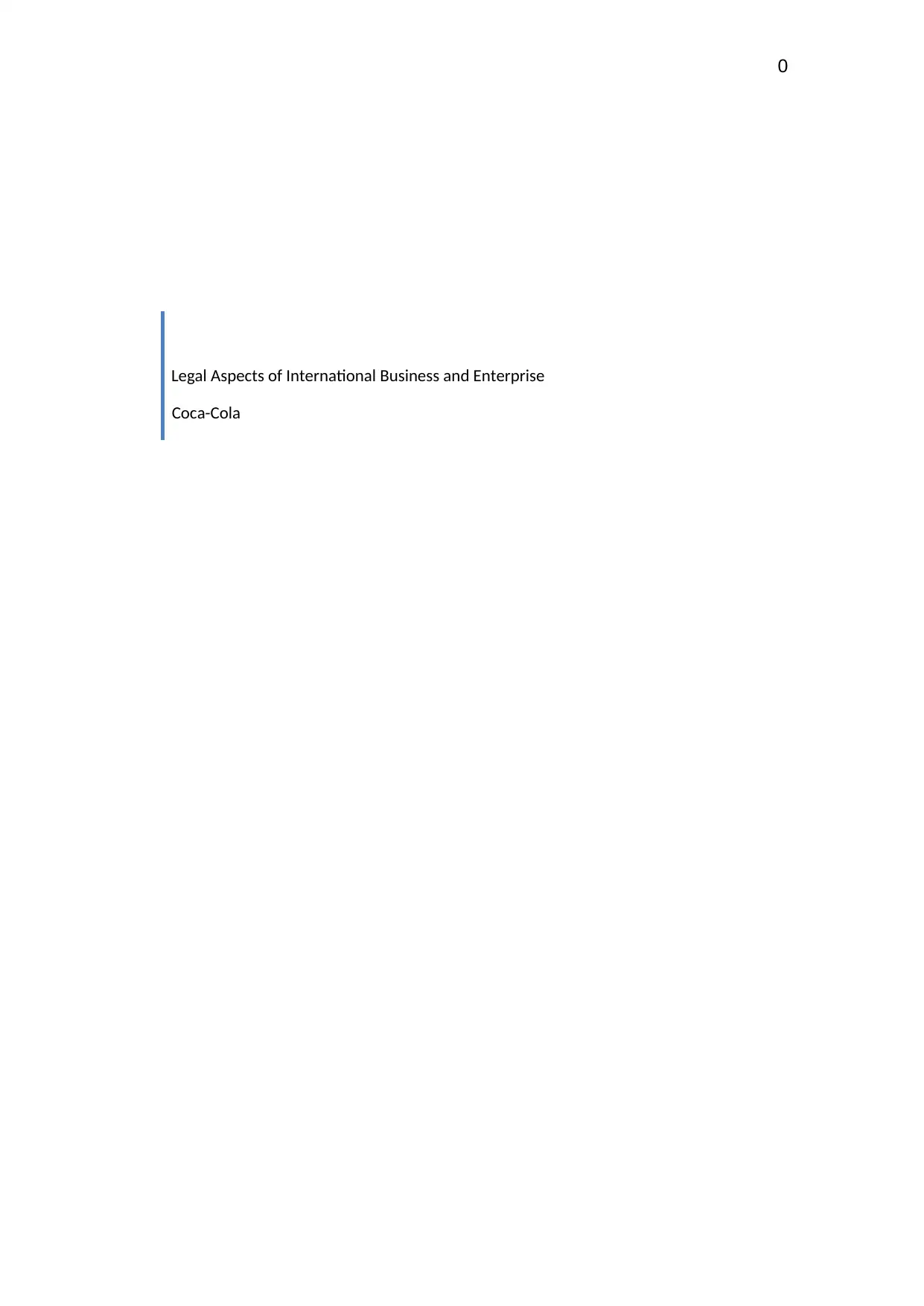
0
Legal Aspects of International Business and Enterprise
Coca-Cola
Legal Aspects of International Business and Enterprise
Coca-Cola
Paraphrase This Document
Need a fresh take? Get an instant paraphrase of this document with our AI Paraphraser
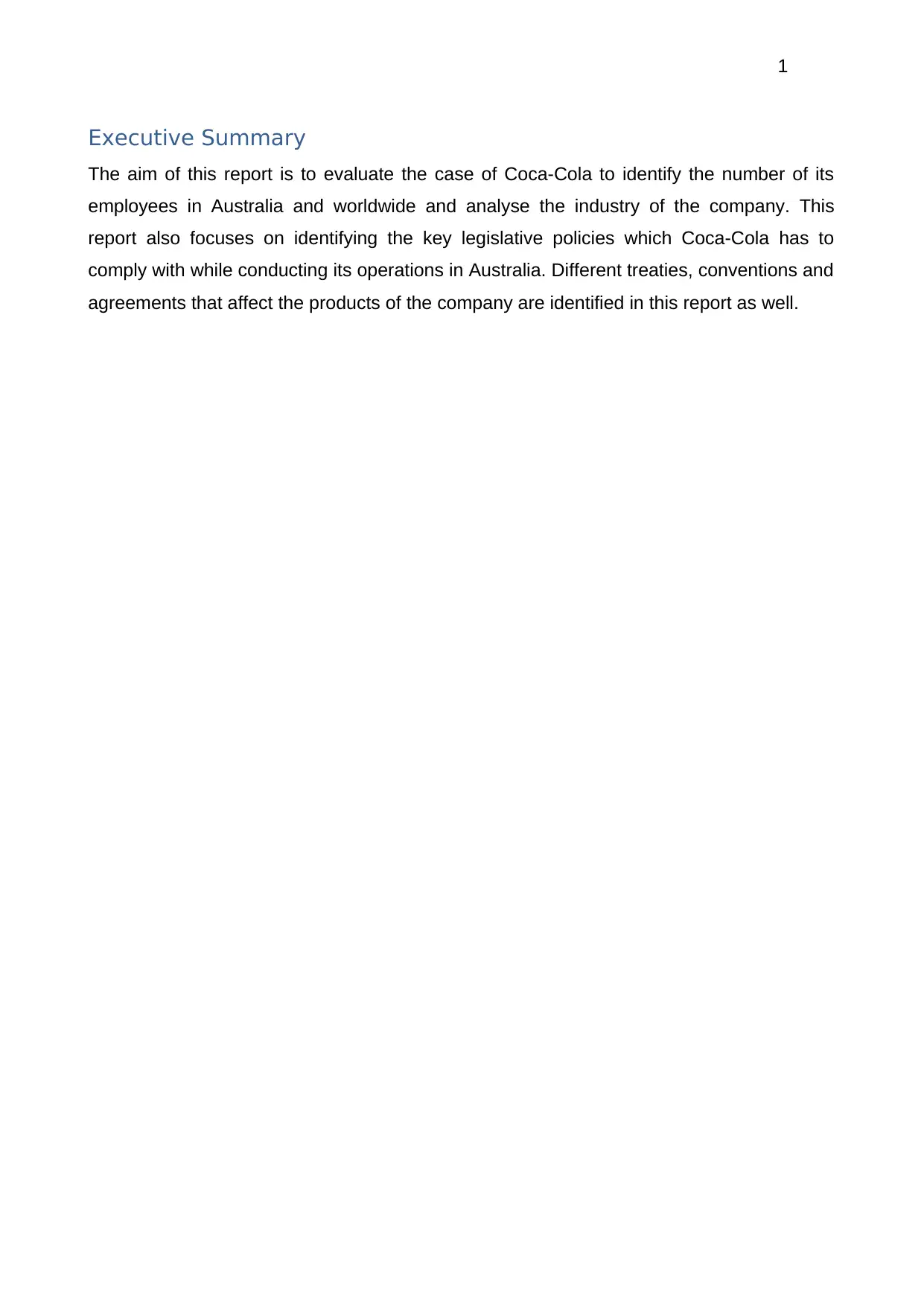
1
Executive Summary
The aim of this report is to evaluate the case of Coca-Cola to identify the number of its
employees in Australia and worldwide and analyse the industry of the company. This
report also focuses on identifying the key legislative policies which Coca-Cola has to
comply with while conducting its operations in Australia. Different treaties, conventions and
agreements that affect the products of the company are identified in this report as well.
Executive Summary
The aim of this report is to evaluate the case of Coca-Cola to identify the number of its
employees in Australia and worldwide and analyse the industry of the company. This
report also focuses on identifying the key legislative policies which Coca-Cola has to
comply with while conducting its operations in Australia. Different treaties, conventions and
agreements that affect the products of the company are identified in this report as well.
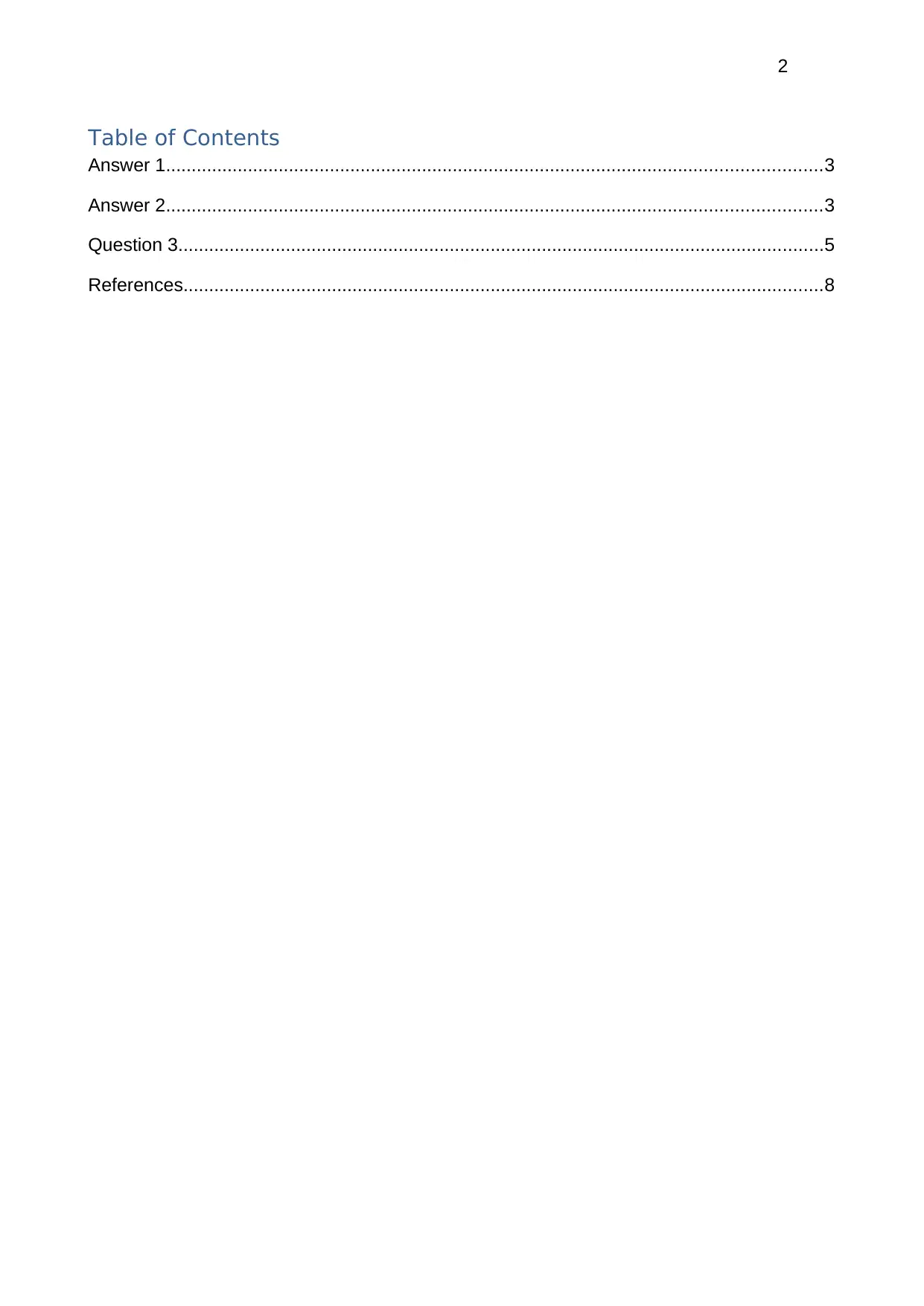
2
Table of Contents
Answer 1................................................................................................................................3
Answer 2................................................................................................................................3
Question 3..............................................................................................................................5
References.............................................................................................................................8
Table of Contents
Answer 1................................................................................................................................3
Answer 2................................................................................................................................3
Question 3..............................................................................................................................5
References.............................................................................................................................8
⊘ This is a preview!⊘
Do you want full access?
Subscribe today to unlock all pages.

Trusted by 1+ million students worldwide
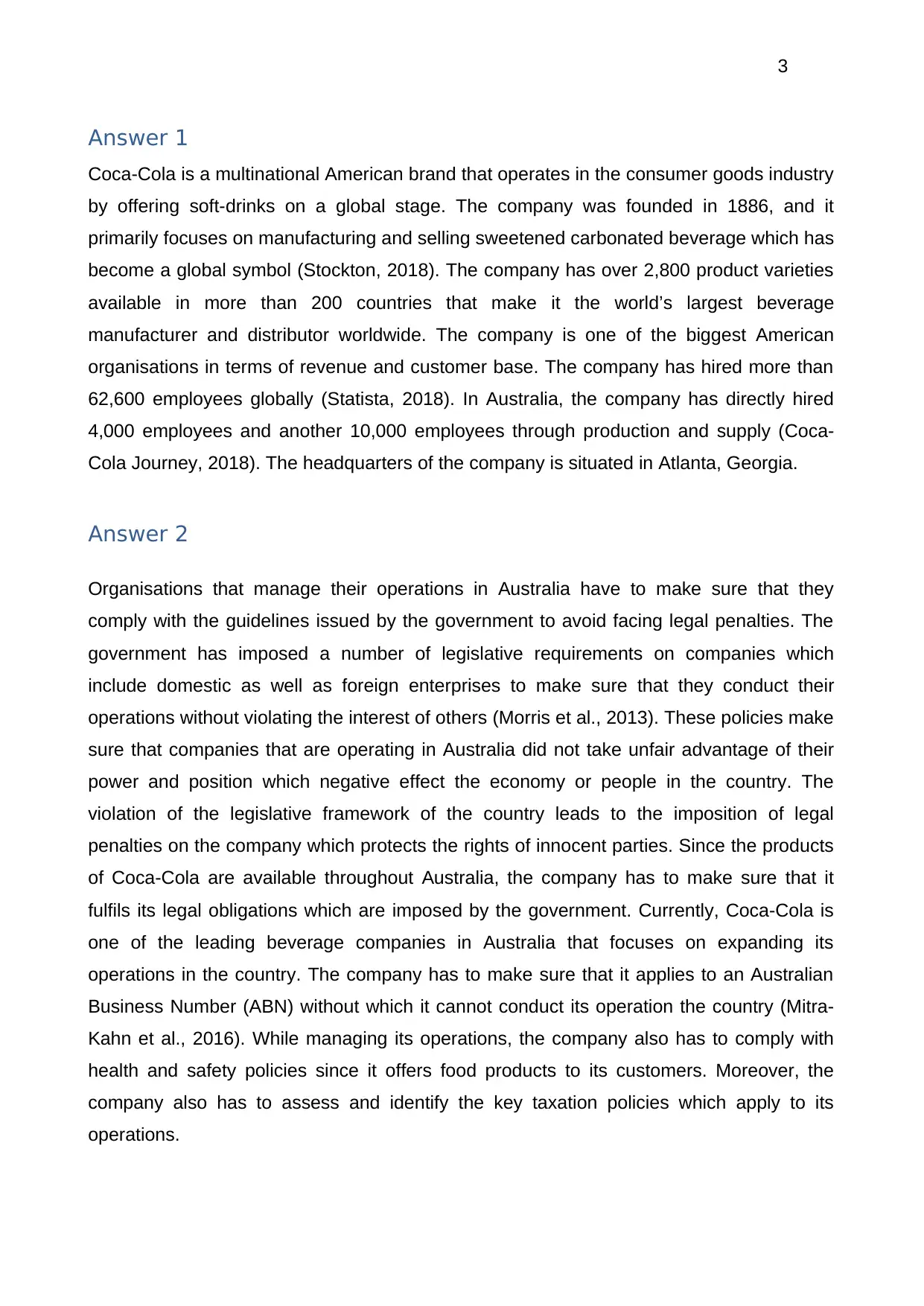
3
Answer 1
Coca-Cola is a multinational American brand that operates in the consumer goods industry
by offering soft-drinks on a global stage. The company was founded in 1886, and it
primarily focuses on manufacturing and selling sweetened carbonated beverage which has
become a global symbol (Stockton, 2018). The company has over 2,800 product varieties
available in more than 200 countries that make it the world’s largest beverage
manufacturer and distributor worldwide. The company is one of the biggest American
organisations in terms of revenue and customer base. The company has hired more than
62,600 employees globally (Statista, 2018). In Australia, the company has directly hired
4,000 employees and another 10,000 employees through production and supply (Coca-
Cola Journey, 2018). The headquarters of the company is situated in Atlanta, Georgia.
Answer 2
Organisations that manage their operations in Australia have to make sure that they
comply with the guidelines issued by the government to avoid facing legal penalties. The
government has imposed a number of legislative requirements on companies which
include domestic as well as foreign enterprises to make sure that they conduct their
operations without violating the interest of others (Morris et al., 2013). These policies make
sure that companies that are operating in Australia did not take unfair advantage of their
power and position which negative effect the economy or people in the country. The
violation of the legislative framework of the country leads to the imposition of legal
penalties on the company which protects the rights of innocent parties. Since the products
of Coca-Cola are available throughout Australia, the company has to make sure that it
fulfils its legal obligations which are imposed by the government. Currently, Coca-Cola is
one of the leading beverage companies in Australia that focuses on expanding its
operations in the country. The company has to make sure that it applies to an Australian
Business Number (ABN) without which it cannot conduct its operation the country (Mitra-
Kahn et al., 2016). While managing its operations, the company also has to comply with
health and safety policies since it offers food products to its customers. Moreover, the
company also has to assess and identify the key taxation policies which apply to its
operations.
Answer 1
Coca-Cola is a multinational American brand that operates in the consumer goods industry
by offering soft-drinks on a global stage. The company was founded in 1886, and it
primarily focuses on manufacturing and selling sweetened carbonated beverage which has
become a global symbol (Stockton, 2018). The company has over 2,800 product varieties
available in more than 200 countries that make it the world’s largest beverage
manufacturer and distributor worldwide. The company is one of the biggest American
organisations in terms of revenue and customer base. The company has hired more than
62,600 employees globally (Statista, 2018). In Australia, the company has directly hired
4,000 employees and another 10,000 employees through production and supply (Coca-
Cola Journey, 2018). The headquarters of the company is situated in Atlanta, Georgia.
Answer 2
Organisations that manage their operations in Australia have to make sure that they
comply with the guidelines issued by the government to avoid facing legal penalties. The
government has imposed a number of legislative requirements on companies which
include domestic as well as foreign enterprises to make sure that they conduct their
operations without violating the interest of others (Morris et al., 2013). These policies make
sure that companies that are operating in Australia did not take unfair advantage of their
power and position which negative effect the economy or people in the country. The
violation of the legislative framework of the country leads to the imposition of legal
penalties on the company which protects the rights of innocent parties. Since the products
of Coca-Cola are available throughout Australia, the company has to make sure that it
fulfils its legal obligations which are imposed by the government. Currently, Coca-Cola is
one of the leading beverage companies in Australia that focuses on expanding its
operations in the country. The company has to make sure that it applies to an Australian
Business Number (ABN) without which it cannot conduct its operation the country (Mitra-
Kahn et al., 2016). While managing its operations, the company also has to comply with
health and safety policies since it offers food products to its customers. Moreover, the
company also has to assess and identify the key taxation policies which apply to its
operations.
Paraphrase This Document
Need a fresh take? Get an instant paraphrase of this document with our AI Paraphraser
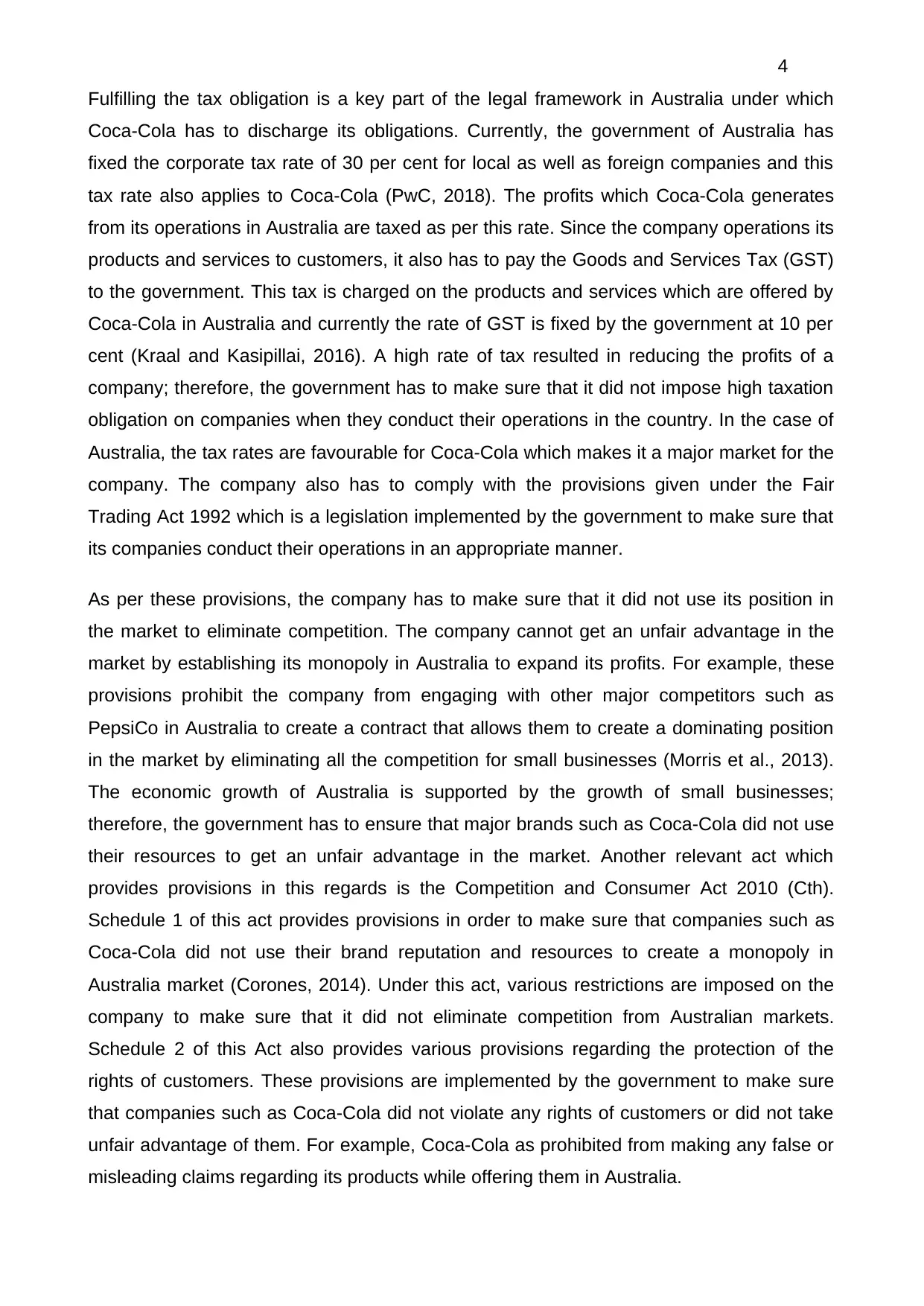
4
Fulfilling the tax obligation is a key part of the legal framework in Australia under which
Coca-Cola has to discharge its obligations. Currently, the government of Australia has
fixed the corporate tax rate of 30 per cent for local as well as foreign companies and this
tax rate also applies to Coca-Cola (PwC, 2018). The profits which Coca-Cola generates
from its operations in Australia are taxed as per this rate. Since the company operations its
products and services to customers, it also has to pay the Goods and Services Tax (GST)
to the government. This tax is charged on the products and services which are offered by
Coca-Cola in Australia and currently the rate of GST is fixed by the government at 10 per
cent (Kraal and Kasipillai, 2016). A high rate of tax resulted in reducing the profits of a
company; therefore, the government has to make sure that it did not impose high taxation
obligation on companies when they conduct their operations in the country. In the case of
Australia, the tax rates are favourable for Coca-Cola which makes it a major market for the
company. The company also has to comply with the provisions given under the Fair
Trading Act 1992 which is a legislation implemented by the government to make sure that
its companies conduct their operations in an appropriate manner.
As per these provisions, the company has to make sure that it did not use its position in
the market to eliminate competition. The company cannot get an unfair advantage in the
market by establishing its monopoly in Australia to expand its profits. For example, these
provisions prohibit the company from engaging with other major competitors such as
PepsiCo in Australia to create a contract that allows them to create a dominating position
in the market by eliminating all the competition for small businesses (Morris et al., 2013).
The economic growth of Australia is supported by the growth of small businesses;
therefore, the government has to ensure that major brands such as Coca-Cola did not use
their resources to get an unfair advantage in the market. Another relevant act which
provides provisions in this regards is the Competition and Consumer Act 2010 (Cth).
Schedule 1 of this act provides provisions in order to make sure that companies such as
Coca-Cola did not use their brand reputation and resources to create a monopoly in
Australia market (Corones, 2014). Under this act, various restrictions are imposed on the
company to make sure that it did not eliminate competition from Australian markets.
Schedule 2 of this Act also provides various provisions regarding the protection of the
rights of customers. These provisions are implemented by the government to make sure
that companies such as Coca-Cola did not violate any rights of customers or did not take
unfair advantage of them. For example, Coca-Cola as prohibited from making any false or
misleading claims regarding its products while offering them in Australia.
Fulfilling the tax obligation is a key part of the legal framework in Australia under which
Coca-Cola has to discharge its obligations. Currently, the government of Australia has
fixed the corporate tax rate of 30 per cent for local as well as foreign companies and this
tax rate also applies to Coca-Cola (PwC, 2018). The profits which Coca-Cola generates
from its operations in Australia are taxed as per this rate. Since the company operations its
products and services to customers, it also has to pay the Goods and Services Tax (GST)
to the government. This tax is charged on the products and services which are offered by
Coca-Cola in Australia and currently the rate of GST is fixed by the government at 10 per
cent (Kraal and Kasipillai, 2016). A high rate of tax resulted in reducing the profits of a
company; therefore, the government has to make sure that it did not impose high taxation
obligation on companies when they conduct their operations in the country. In the case of
Australia, the tax rates are favourable for Coca-Cola which makes it a major market for the
company. The company also has to comply with the provisions given under the Fair
Trading Act 1992 which is a legislation implemented by the government to make sure that
its companies conduct their operations in an appropriate manner.
As per these provisions, the company has to make sure that it did not use its position in
the market to eliminate competition. The company cannot get an unfair advantage in the
market by establishing its monopoly in Australia to expand its profits. For example, these
provisions prohibit the company from engaging with other major competitors such as
PepsiCo in Australia to create a contract that allows them to create a dominating position
in the market by eliminating all the competition for small businesses (Morris et al., 2013).
The economic growth of Australia is supported by the growth of small businesses;
therefore, the government has to ensure that major brands such as Coca-Cola did not use
their resources to get an unfair advantage in the market. Another relevant act which
provides provisions in this regards is the Competition and Consumer Act 2010 (Cth).
Schedule 1 of this act provides provisions in order to make sure that companies such as
Coca-Cola did not use their brand reputation and resources to create a monopoly in
Australia market (Corones, 2014). Under this act, various restrictions are imposed on the
company to make sure that it did not eliminate competition from Australian markets.
Schedule 2 of this Act also provides various provisions regarding the protection of the
rights of customers. These provisions are implemented by the government to make sure
that companies such as Coca-Cola did not violate any rights of customers or did not take
unfair advantage of them. For example, Coca-Cola as prohibited from making any false or
misleading claims regarding its products while offering them in Australia.
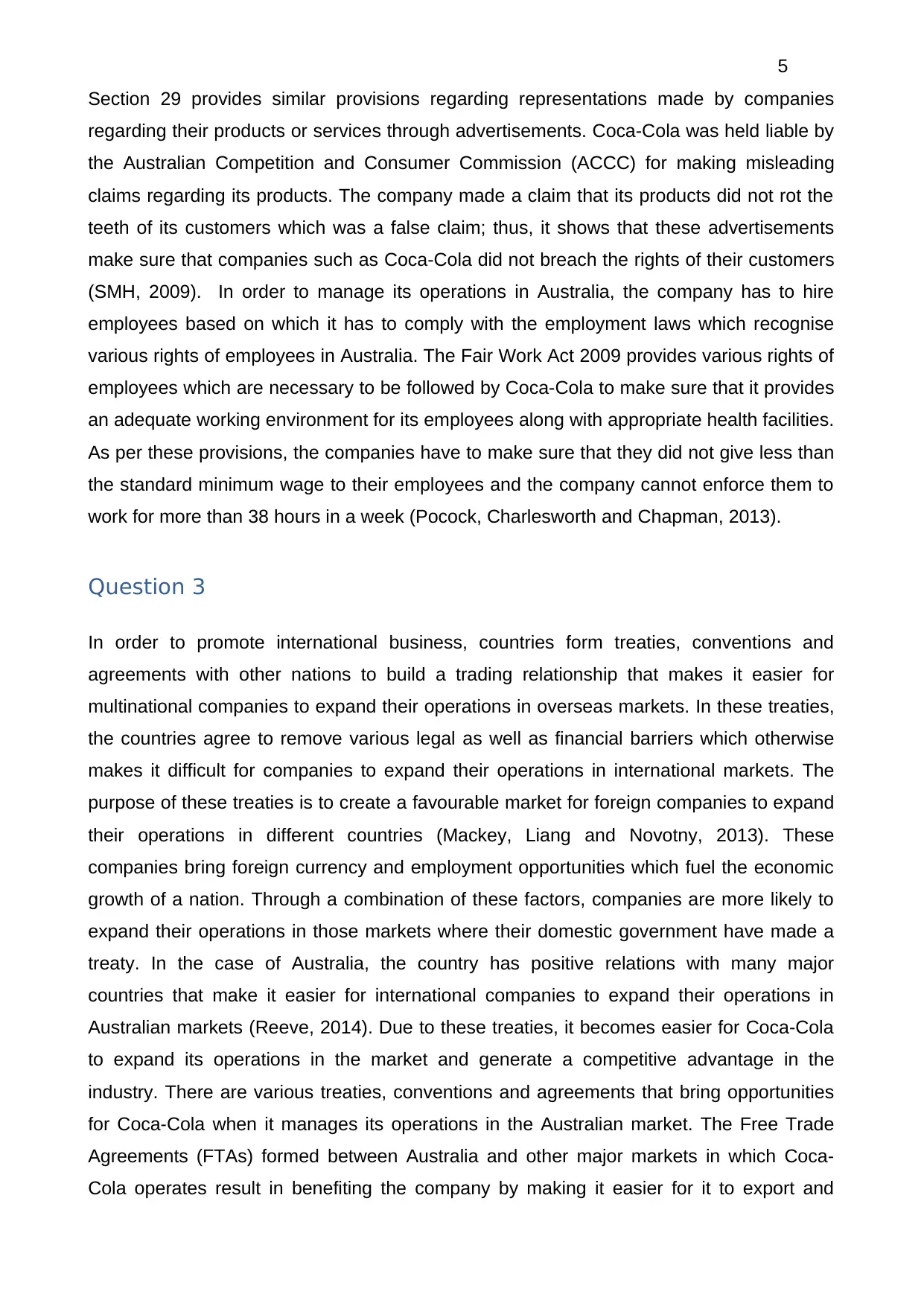
5
Section 29 provides similar provisions regarding representations made by companies
regarding their products or services through advertisements. Coca-Cola was held liable by
the Australian Competition and Consumer Commission (ACCC) for making misleading
claims regarding its products. The company made a claim that its products did not rot the
teeth of its customers which was a false claim; thus, it shows that these advertisements
make sure that companies such as Coca-Cola did not breach the rights of their customers
(SMH, 2009). In order to manage its operations in Australia, the company has to hire
employees based on which it has to comply with the employment laws which recognise
various rights of employees in Australia. The Fair Work Act 2009 provides various rights of
employees which are necessary to be followed by Coca-Cola to make sure that it provides
an adequate working environment for its employees along with appropriate health facilities.
As per these provisions, the companies have to make sure that they did not give less than
the standard minimum wage to their employees and the company cannot enforce them to
work for more than 38 hours in a week (Pocock, Charlesworth and Chapman, 2013).
Question 3
In order to promote international business, countries form treaties, conventions and
agreements with other nations to build a trading relationship that makes it easier for
multinational companies to expand their operations in overseas markets. In these treaties,
the countries agree to remove various legal as well as financial barriers which otherwise
makes it difficult for companies to expand their operations in international markets. The
purpose of these treaties is to create a favourable market for foreign companies to expand
their operations in different countries (Mackey, Liang and Novotny, 2013). These
companies bring foreign currency and employment opportunities which fuel the economic
growth of a nation. Through a combination of these factors, companies are more likely to
expand their operations in those markets where their domestic government have made a
treaty. In the case of Australia, the country has positive relations with many major
countries that make it easier for international companies to expand their operations in
Australian markets (Reeve, 2014). Due to these treaties, it becomes easier for Coca-Cola
to expand its operations in the market and generate a competitive advantage in the
industry. There are various treaties, conventions and agreements that bring opportunities
for Coca-Cola when it manages its operations in the Australian market. The Free Trade
Agreements (FTAs) formed between Australia and other major markets in which Coca-
Cola operates result in benefiting the company by making it easier for it to export and
Section 29 provides similar provisions regarding representations made by companies
regarding their products or services through advertisements. Coca-Cola was held liable by
the Australian Competition and Consumer Commission (ACCC) for making misleading
claims regarding its products. The company made a claim that its products did not rot the
teeth of its customers which was a false claim; thus, it shows that these advertisements
make sure that companies such as Coca-Cola did not breach the rights of their customers
(SMH, 2009). In order to manage its operations in Australia, the company has to hire
employees based on which it has to comply with the employment laws which recognise
various rights of employees in Australia. The Fair Work Act 2009 provides various rights of
employees which are necessary to be followed by Coca-Cola to make sure that it provides
an adequate working environment for its employees along with appropriate health facilities.
As per these provisions, the companies have to make sure that they did not give less than
the standard minimum wage to their employees and the company cannot enforce them to
work for more than 38 hours in a week (Pocock, Charlesworth and Chapman, 2013).
Question 3
In order to promote international business, countries form treaties, conventions and
agreements with other nations to build a trading relationship that makes it easier for
multinational companies to expand their operations in overseas markets. In these treaties,
the countries agree to remove various legal as well as financial barriers which otherwise
makes it difficult for companies to expand their operations in international markets. The
purpose of these treaties is to create a favourable market for foreign companies to expand
their operations in different countries (Mackey, Liang and Novotny, 2013). These
companies bring foreign currency and employment opportunities which fuel the economic
growth of a nation. Through a combination of these factors, companies are more likely to
expand their operations in those markets where their domestic government have made a
treaty. In the case of Australia, the country has positive relations with many major
countries that make it easier for international companies to expand their operations in
Australian markets (Reeve, 2014). Due to these treaties, it becomes easier for Coca-Cola
to expand its operations in the market and generate a competitive advantage in the
industry. There are various treaties, conventions and agreements that bring opportunities
for Coca-Cola when it manages its operations in the Australian market. The Free Trade
Agreements (FTAs) formed between Australia and other major markets in which Coca-
Cola operates result in benefiting the company by making it easier for it to export and
⊘ This is a preview!⊘
Do you want full access?
Subscribe today to unlock all pages.

Trusted by 1+ million students worldwide
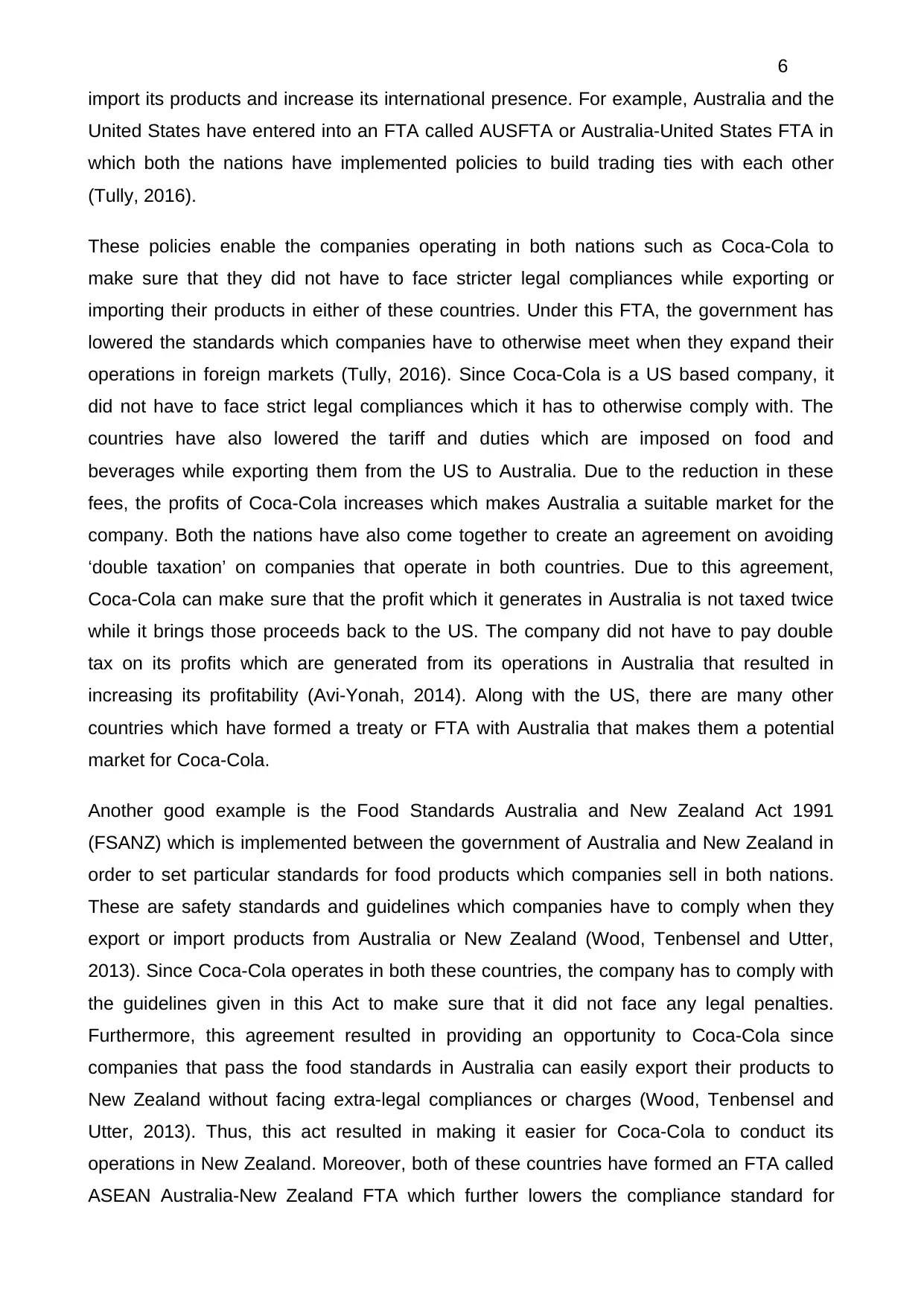
6
import its products and increase its international presence. For example, Australia and the
United States have entered into an FTA called AUSFTA or Australia-United States FTA in
which both the nations have implemented policies to build trading ties with each other
(Tully, 2016).
These policies enable the companies operating in both nations such as Coca-Cola to
make sure that they did not have to face stricter legal compliances while exporting or
importing their products in either of these countries. Under this FTA, the government has
lowered the standards which companies have to otherwise meet when they expand their
operations in foreign markets (Tully, 2016). Since Coca-Cola is a US based company, it
did not have to face strict legal compliances which it has to otherwise comply with. The
countries have also lowered the tariff and duties which are imposed on food and
beverages while exporting them from the US to Australia. Due to the reduction in these
fees, the profits of Coca-Cola increases which makes Australia a suitable market for the
company. Both the nations have also come together to create an agreement on avoiding
‘double taxation’ on companies that operate in both countries. Due to this agreement,
Coca-Cola can make sure that the profit which it generates in Australia is not taxed twice
while it brings those proceeds back to the US. The company did not have to pay double
tax on its profits which are generated from its operations in Australia that resulted in
increasing its profitability (Avi-Yonah, 2014). Along with the US, there are many other
countries which have formed a treaty or FTA with Australia that makes them a potential
market for Coca-Cola.
Another good example is the Food Standards Australia and New Zealand Act 1991
(FSANZ) which is implemented between the government of Australia and New Zealand in
order to set particular standards for food products which companies sell in both nations.
These are safety standards and guidelines which companies have to comply when they
export or import products from Australia or New Zealand (Wood, Tenbensel and Utter,
2013). Since Coca-Cola operates in both these countries, the company has to comply with
the guidelines given in this Act to make sure that it did not face any legal penalties.
Furthermore, this agreement resulted in providing an opportunity to Coca-Cola since
companies that pass the food standards in Australia can easily export their products to
New Zealand without facing extra-legal compliances or charges (Wood, Tenbensel and
Utter, 2013). Thus, this act resulted in making it easier for Coca-Cola to conduct its
operations in New Zealand. Moreover, both of these countries have formed an FTA called
ASEAN Australia-New Zealand FTA which further lowers the compliance standard for
import its products and increase its international presence. For example, Australia and the
United States have entered into an FTA called AUSFTA or Australia-United States FTA in
which both the nations have implemented policies to build trading ties with each other
(Tully, 2016).
These policies enable the companies operating in both nations such as Coca-Cola to
make sure that they did not have to face stricter legal compliances while exporting or
importing their products in either of these countries. Under this FTA, the government has
lowered the standards which companies have to otherwise meet when they expand their
operations in foreign markets (Tully, 2016). Since Coca-Cola is a US based company, it
did not have to face strict legal compliances which it has to otherwise comply with. The
countries have also lowered the tariff and duties which are imposed on food and
beverages while exporting them from the US to Australia. Due to the reduction in these
fees, the profits of Coca-Cola increases which makes Australia a suitable market for the
company. Both the nations have also come together to create an agreement on avoiding
‘double taxation’ on companies that operate in both countries. Due to this agreement,
Coca-Cola can make sure that the profit which it generates in Australia is not taxed twice
while it brings those proceeds back to the US. The company did not have to pay double
tax on its profits which are generated from its operations in Australia that resulted in
increasing its profitability (Avi-Yonah, 2014). Along with the US, there are many other
countries which have formed a treaty or FTA with Australia that makes them a potential
market for Coca-Cola.
Another good example is the Food Standards Australia and New Zealand Act 1991
(FSANZ) which is implemented between the government of Australia and New Zealand in
order to set particular standards for food products which companies sell in both nations.
These are safety standards and guidelines which companies have to comply when they
export or import products from Australia or New Zealand (Wood, Tenbensel and Utter,
2013). Since Coca-Cola operates in both these countries, the company has to comply with
the guidelines given in this Act to make sure that it did not face any legal penalties.
Furthermore, this agreement resulted in providing an opportunity to Coca-Cola since
companies that pass the food standards in Australia can easily export their products to
New Zealand without facing extra-legal compliances or charges (Wood, Tenbensel and
Utter, 2013). Thus, this act resulted in making it easier for Coca-Cola to conduct its
operations in New Zealand. Moreover, both of these countries have formed an FTA called
ASEAN Australia-New Zealand FTA which further lowers the compliance standard for
Paraphrase This Document
Need a fresh take? Get an instant paraphrase of this document with our AI Paraphraser
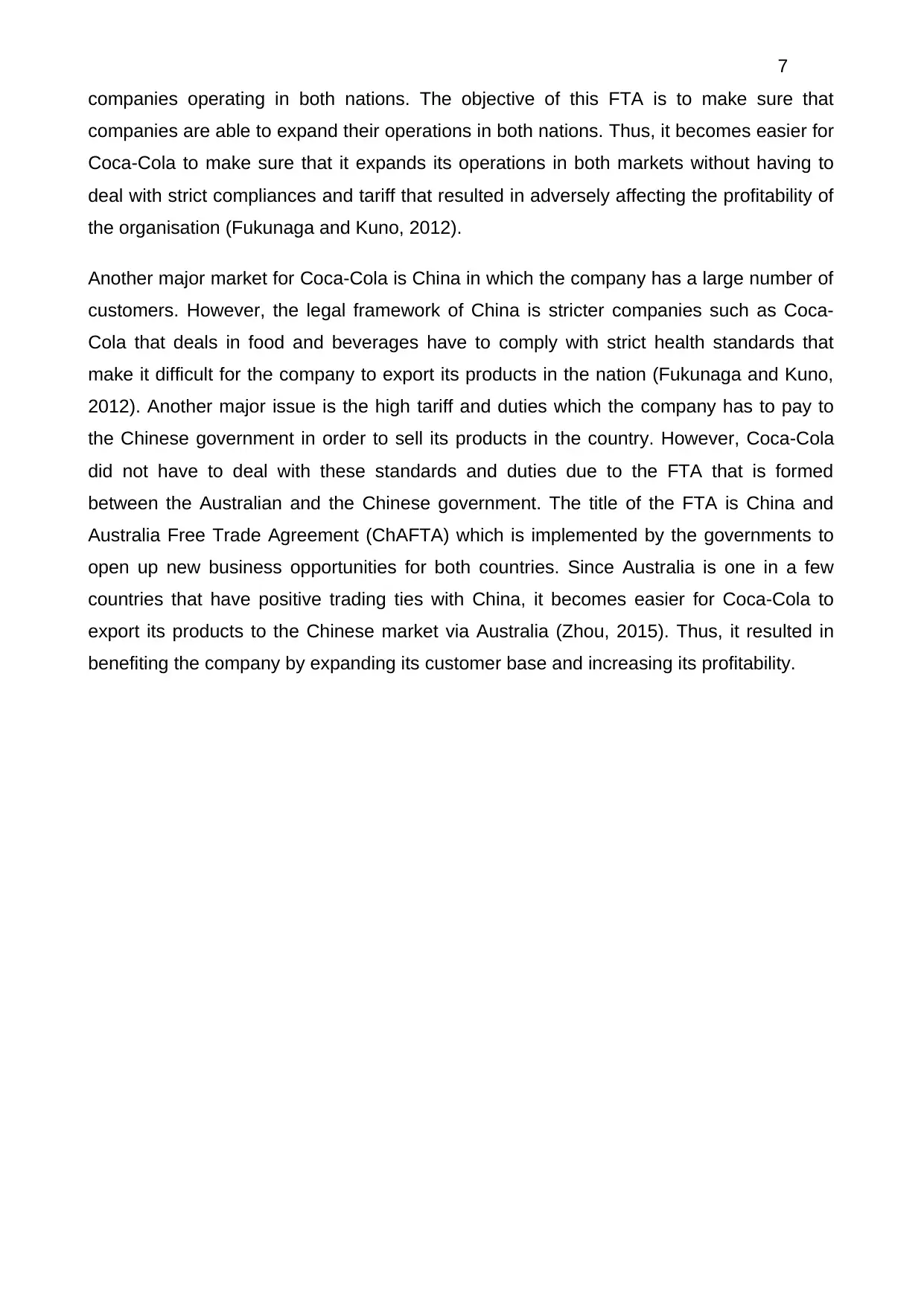
7
companies operating in both nations. The objective of this FTA is to make sure that
companies are able to expand their operations in both nations. Thus, it becomes easier for
Coca-Cola to make sure that it expands its operations in both markets without having to
deal with strict compliances and tariff that resulted in adversely affecting the profitability of
the organisation (Fukunaga and Kuno, 2012).
Another major market for Coca-Cola is China in which the company has a large number of
customers. However, the legal framework of China is stricter companies such as Coca-
Cola that deals in food and beverages have to comply with strict health standards that
make it difficult for the company to export its products in the nation (Fukunaga and Kuno,
2012). Another major issue is the high tariff and duties which the company has to pay to
the Chinese government in order to sell its products in the country. However, Coca-Cola
did not have to deal with these standards and duties due to the FTA that is formed
between the Australian and the Chinese government. The title of the FTA is China and
Australia Free Trade Agreement (ChAFTA) which is implemented by the governments to
open up new business opportunities for both countries. Since Australia is one in a few
countries that have positive trading ties with China, it becomes easier for Coca-Cola to
export its products to the Chinese market via Australia (Zhou, 2015). Thus, it resulted in
benefiting the company by expanding its customer base and increasing its profitability.
companies operating in both nations. The objective of this FTA is to make sure that
companies are able to expand their operations in both nations. Thus, it becomes easier for
Coca-Cola to make sure that it expands its operations in both markets without having to
deal with strict compliances and tariff that resulted in adversely affecting the profitability of
the organisation (Fukunaga and Kuno, 2012).
Another major market for Coca-Cola is China in which the company has a large number of
customers. However, the legal framework of China is stricter companies such as Coca-
Cola that deals in food and beverages have to comply with strict health standards that
make it difficult for the company to export its products in the nation (Fukunaga and Kuno,
2012). Another major issue is the high tariff and duties which the company has to pay to
the Chinese government in order to sell its products in the country. However, Coca-Cola
did not have to deal with these standards and duties due to the FTA that is formed
between the Australian and the Chinese government. The title of the FTA is China and
Australia Free Trade Agreement (ChAFTA) which is implemented by the governments to
open up new business opportunities for both countries. Since Australia is one in a few
countries that have positive trading ties with China, it becomes easier for Coca-Cola to
export its products to the Chinese market via Australia (Zhou, 2015). Thus, it resulted in
benefiting the company by expanding its customer base and increasing its profitability.
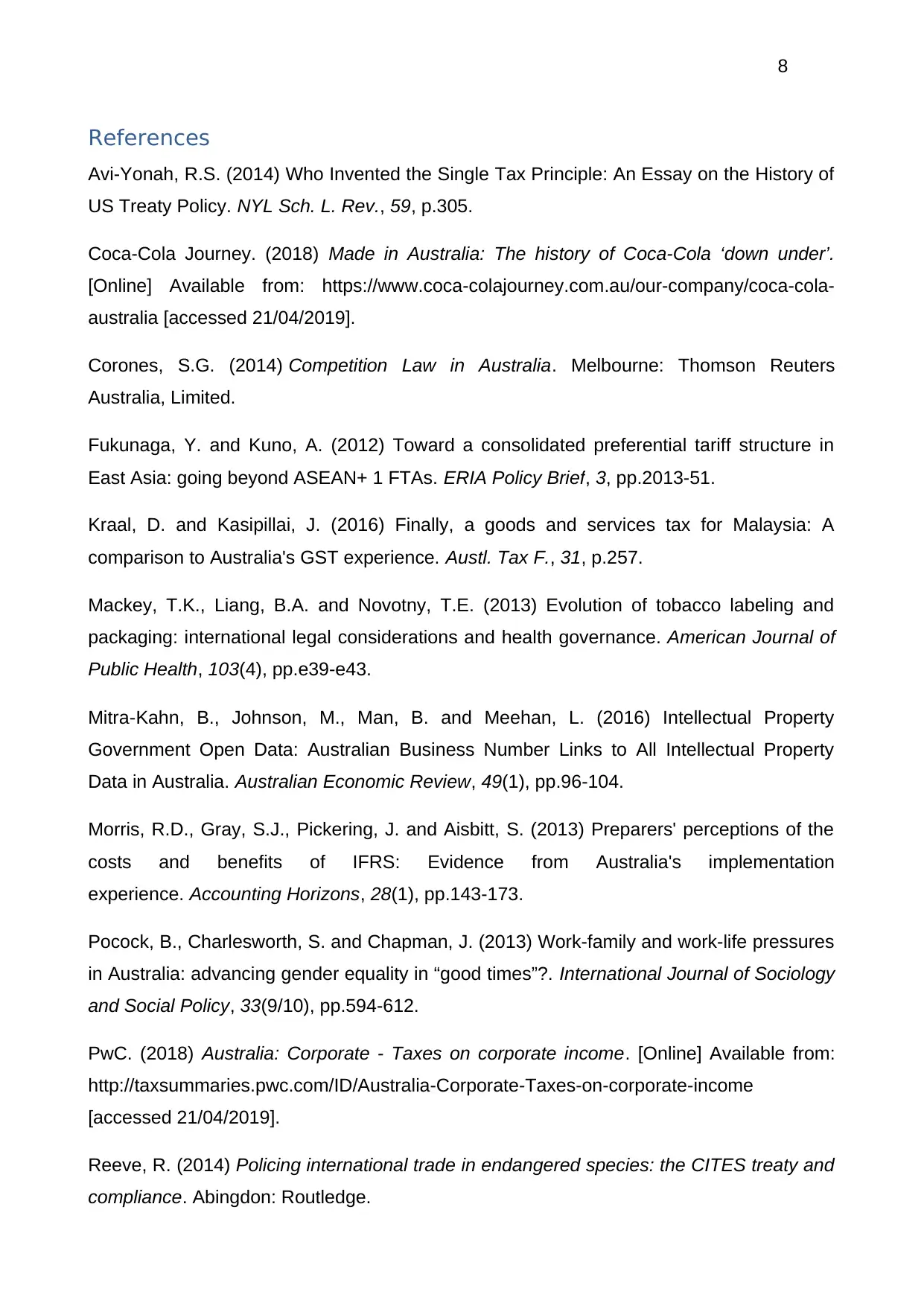
8
References
Avi-Yonah, R.S. (2014) Who Invented the Single Tax Principle: An Essay on the History of
US Treaty Policy. NYL Sch. L. Rev., 59, p.305.
Coca-Cola Journey. (2018) Made in Australia: The history of Coca-Cola ‘down under’.
[Online] Available from: https://www.coca-colajourney.com.au/our-company/coca-cola-
australia [accessed 21/04/2019].
Corones, S.G. (2014) Competition Law in Australia. Melbourne: Thomson Reuters
Australia, Limited.
Fukunaga, Y. and Kuno, A. (2012) Toward a consolidated preferential tariff structure in
East Asia: going beyond ASEAN+ 1 FTAs. ERIA Policy Brief, 3, pp.2013-51.
Kraal, D. and Kasipillai, J. (2016) Finally, a goods and services tax for Malaysia: A
comparison to Australia's GST experience. Austl. Tax F., 31, p.257.
Mackey, T.K., Liang, B.A. and Novotny, T.E. (2013) Evolution of tobacco labeling and
packaging: international legal considerations and health governance. American Journal of
Public Health, 103(4), pp.e39-e43.
Mitra‐Kahn, B., Johnson, M., Man, B. and Meehan, L. (2016) Intellectual Property
Government Open Data: Australian Business Number Links to All Intellectual Property
Data in Australia. Australian Economic Review, 49(1), pp.96-104.
Morris, R.D., Gray, S.J., Pickering, J. and Aisbitt, S. (2013) Preparers' perceptions of the
costs and benefits of IFRS: Evidence from Australia's implementation
experience. Accounting Horizons, 28(1), pp.143-173.
Pocock, B., Charlesworth, S. and Chapman, J. (2013) Work-family and work-life pressures
in Australia: advancing gender equality in “good times”?. International Journal of Sociology
and Social Policy, 33(9/10), pp.594-612.
PwC. (2018) Australia: Corporate - Taxes on corporate income. [Online] Available from:
http://taxsummaries.pwc.com/ID/Australia-Corporate-Taxes-on-corporate-income
[accessed 21/04/2019].
Reeve, R. (2014) Policing international trade in endangered species: the CITES treaty and
compliance. Abingdon: Routledge.
References
Avi-Yonah, R.S. (2014) Who Invented the Single Tax Principle: An Essay on the History of
US Treaty Policy. NYL Sch. L. Rev., 59, p.305.
Coca-Cola Journey. (2018) Made in Australia: The history of Coca-Cola ‘down under’.
[Online] Available from: https://www.coca-colajourney.com.au/our-company/coca-cola-
australia [accessed 21/04/2019].
Corones, S.G. (2014) Competition Law in Australia. Melbourne: Thomson Reuters
Australia, Limited.
Fukunaga, Y. and Kuno, A. (2012) Toward a consolidated preferential tariff structure in
East Asia: going beyond ASEAN+ 1 FTAs. ERIA Policy Brief, 3, pp.2013-51.
Kraal, D. and Kasipillai, J. (2016) Finally, a goods and services tax for Malaysia: A
comparison to Australia's GST experience. Austl. Tax F., 31, p.257.
Mackey, T.K., Liang, B.A. and Novotny, T.E. (2013) Evolution of tobacco labeling and
packaging: international legal considerations and health governance. American Journal of
Public Health, 103(4), pp.e39-e43.
Mitra‐Kahn, B., Johnson, M., Man, B. and Meehan, L. (2016) Intellectual Property
Government Open Data: Australian Business Number Links to All Intellectual Property
Data in Australia. Australian Economic Review, 49(1), pp.96-104.
Morris, R.D., Gray, S.J., Pickering, J. and Aisbitt, S. (2013) Preparers' perceptions of the
costs and benefits of IFRS: Evidence from Australia's implementation
experience. Accounting Horizons, 28(1), pp.143-173.
Pocock, B., Charlesworth, S. and Chapman, J. (2013) Work-family and work-life pressures
in Australia: advancing gender equality in “good times”?. International Journal of Sociology
and Social Policy, 33(9/10), pp.594-612.
PwC. (2018) Australia: Corporate - Taxes on corporate income. [Online] Available from:
http://taxsummaries.pwc.com/ID/Australia-Corporate-Taxes-on-corporate-income
[accessed 21/04/2019].
Reeve, R. (2014) Policing international trade in endangered species: the CITES treaty and
compliance. Abingdon: Routledge.
⊘ This is a preview!⊘
Do you want full access?
Subscribe today to unlock all pages.

Trusted by 1+ million students worldwide
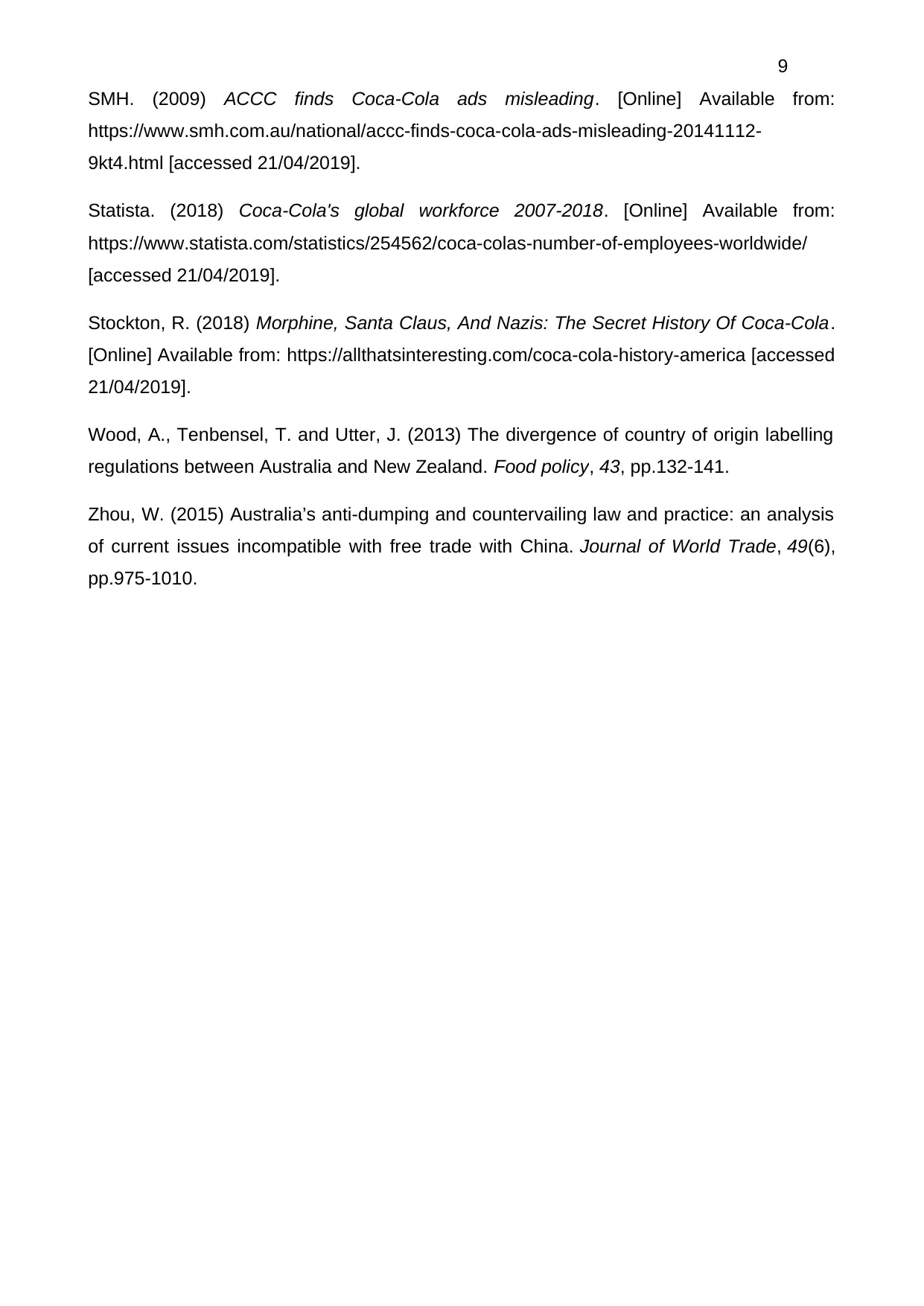
9
SMH. (2009) ACCC finds Coca-Cola ads misleading. [Online] Available from:
https://www.smh.com.au/national/accc-finds-coca-cola-ads-misleading-20141112-
9kt4.html [accessed 21/04/2019].
Statista. (2018) Coca-Cola's global workforce 2007-2018. [Online] Available from:
https://www.statista.com/statistics/254562/coca-colas-number-of-employees-worldwide/
[accessed 21/04/2019].
Stockton, R. (2018) Morphine, Santa Claus, And Nazis: The Secret History Of Coca-Cola.
[Online] Available from: https://allthatsinteresting.com/coca-cola-history-america [accessed
21/04/2019].
Wood, A., Tenbensel, T. and Utter, J. (2013) The divergence of country of origin labelling
regulations between Australia and New Zealand. Food policy, 43, pp.132-141.
Zhou, W. (2015) Australia’s anti-dumping and countervailing law and practice: an analysis
of current issues incompatible with free trade with China. Journal of World Trade, 49(6),
pp.975-1010.
SMH. (2009) ACCC finds Coca-Cola ads misleading. [Online] Available from:
https://www.smh.com.au/national/accc-finds-coca-cola-ads-misleading-20141112-
9kt4.html [accessed 21/04/2019].
Statista. (2018) Coca-Cola's global workforce 2007-2018. [Online] Available from:
https://www.statista.com/statistics/254562/coca-colas-number-of-employees-worldwide/
[accessed 21/04/2019].
Stockton, R. (2018) Morphine, Santa Claus, And Nazis: The Secret History Of Coca-Cola.
[Online] Available from: https://allthatsinteresting.com/coca-cola-history-america [accessed
21/04/2019].
Wood, A., Tenbensel, T. and Utter, J. (2013) The divergence of country of origin labelling
regulations between Australia and New Zealand. Food policy, 43, pp.132-141.
Zhou, W. (2015) Australia’s anti-dumping and countervailing law and practice: an analysis
of current issues incompatible with free trade with China. Journal of World Trade, 49(6),
pp.975-1010.
1 out of 10
Related Documents
Your All-in-One AI-Powered Toolkit for Academic Success.
+13062052269
info@desklib.com
Available 24*7 on WhatsApp / Email
![[object Object]](/_next/static/media/star-bottom.7253800d.svg)
Unlock your academic potential
Copyright © 2020–2026 A2Z Services. All Rights Reserved. Developed and managed by ZUCOL.





